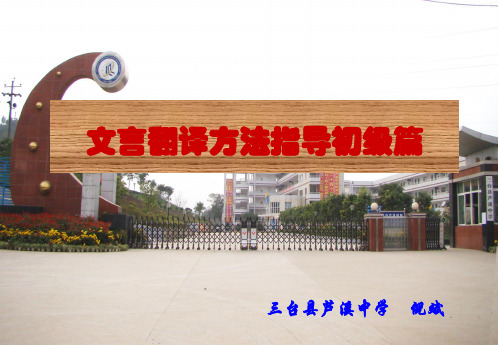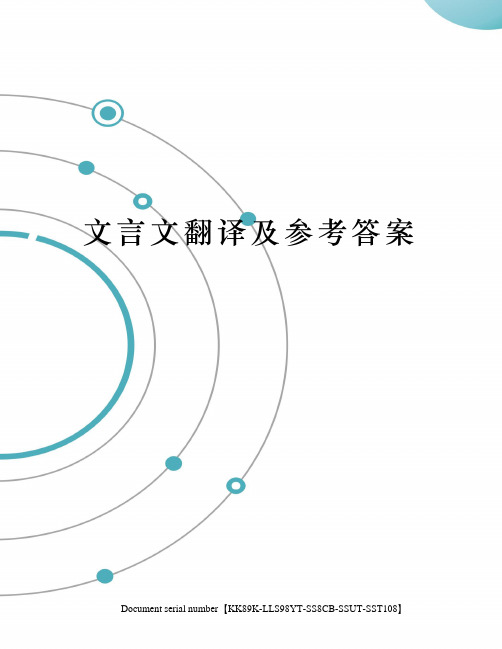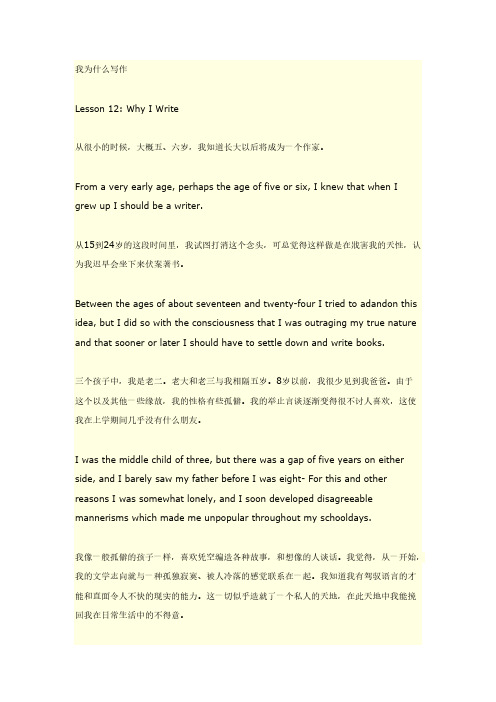【VIP专享】两篇阅读、句子翻译和段落翻译以及答案
【VIP专享】文言翻译方法指导(初级篇)

信达雅
“信”,即准确无误,忠于 今欲降之而反戮其使,无乃
原文,不随意增减内容和 不可乎?
改变风格;
如“手之所触,肩之所倚,足之所履”中的“之”, “夫六国与秦皆诸侯”中的“夫”,“初,奉使往来, 无留北者”中“往来”是个偏义复词,“来”没有必 要译出。
(3)换:
将单音词换成双音词(势-局势、形势、优势、趋势), 用现代词汇替换古代词汇(吾-我,汝-你,走-逃 跑),词类活用词换成活用后的词,通假字换成本 字……总之,留的留下,删的删去,其他的都是“换” 的对象了,这是字词翻译的重点也是难点所在。
4.权勃然曰:“吾不能举全吴之地,十万之众,受制于 人,吾计决矣!非刘豫州莫可以当曹操者,然豫州新败 之后,安能抗此难乎?”
译:孙权发怒说:“我不能拿全东吴的土地,十万将士, 来受人控制,我的主意决定了!除了刘豫州就没有谁(同 我一齐)抵挡曹操的了,可是刘豫州在刚打败仗之后,怎 能抗得住这个大难呢?”
(孟尝君只不过是鸡鸣狗盗之辈的头目罢了,哪里说得 上得士不得士呢!) (留——孟尝君、鸡鸣狗盗,换——雄,贯——哪里说 得上得士不得士呢)
3.若能以吴、越之众与中国抗衡,不如早与之绝;若不 能,何不按兵束甲,北面而事之!
译:如果能用江东的兵力同中原对抗,不如趁早同他绝裂; 如果不能,为什么不放下武器、捆起铠甲,向他面北朝拜 称臣呢!
渑池会结束后, 赵王等回到赵国,因为蔺 相如功劳大,赵王 任命 蔺相如做上卿。
(6)贯:指要根据上下文语境,灵活贯通地
翻译。这往往指前五种方法都用上了还不能解决 问题时。
必须说明的是,对文言文翻译而言,我们首先要 “直译”(留删换调补),在“直译”不能完成 时,不得已才用“意译”,这个“贯”就是所谓 的“意译”。
文言文翻译及参考答案

文言文翻译及参考答案 Document serial number【KK89K-LLS98YT-SS8CB-SSUT-SST108】文言文翻译及答案郑人买履有欲买履足,至之市,而忘之。
已得,乃曰“吾。
”反归取之。
及反,市罢,不得。
人曰:“何不试之以足”“宁信度,无自信也。
”有个想要买鞋子的郑国人,先测量好自己脚的尺码,把尺码放在他的座位上,等到前往集市,却忘了带量好的尺码。
已经拿到鞋子,却说:“我忘记带量好的尺码了。
”就返回家去取量好的尺码。
等到他返回集市的时候,集市已经散了,最后郑国人没能买到鞋子。
有人问他说:“为什么你不用自己的脚去试一试呢”他说:“我宁可相信量好的尺码,也不相信自己的脚。
”1.选自《韩非子·外储说左上》。
1.郑:春秋时代郑国,在现今河南省的新郑县。
2.欲:将要,想要。
3.者:(怎么样)的人。
(定语后置)4.先:首先,事先。
5.度(duó):衡量。
用尺子度量的意思(动词)6.而:顺承连词意为然后7.置:放,搁在。
(动词)8.之:代词,它,此处指量好的尺码。
9.其:他的,指郑人的。
(代词)10.坐:“座”,座位。
11.至:等到。
12.之:到……去,前往。
(动词)13.操:拿、携带。
(动词)14.已:已经。
(时间副词)15.得:得到;拿到。
16.履:鞋子,革履。
(名词)17.乃:于是(就)18.持:拿,在本文中同“操”。
(动词)19.度(dù):量好的尺码,这里作动词用,即计算、测量的意思。
(名词)20.之:文言代名词,这里指量好的。
21.操:操持,带上拿着的意思22.及:等到。
23.反:通“返”,返回。
24.罢:引申为散了,完结的意思,这里指集市已经解散。
25.遂:于是。
26.曰:说。
27.宁(nìng):副词。
宁可,宁愿。
28.无:虚无,没有,这里是不能、不可的意思。
29.自信:相信自己。
30.以:用。
31.吾:我。
32.市罢:集市散了33.至之市:等到前往集市。
[VIP专享]文言文启蒙读本1到62课答案翻译
![[VIP专享]文言文启蒙读本1到62课答案翻译](https://img.taocdn.com/s3/m/8d76eeacc8d376eeaeaa3191.png)
1、鹦鹉灭火有一群鹦鹉飞到一座山上,山中的禽兽都(很喜欢),互敬互爱。
鹦鹉想,这里虽然感到很快乐,但是不能长久居留下去,于是便飞走了。
过了好几个月以后,山中突然失火。
鹦鹉远远地看到,便用自己的羽毛沾湿水,飞到山上,洒水去救火。
天神见此,说道:“你虽然很有意气和气志,但又有什么用(效果)呢!”鹦鹉答道:“我虽然知道不能够把火救灭,但是我曾经住过这座山,与山上的禽兽友好相处,亲如兄弟,(山中这样着火),我不忍心看下去啊!”天神听了很感动,以示嘉奖,便把山火灭了。
2、鳝救婢高怀中在扬州的小东门卖鳝鱼面。
他每天要杀数十条鳝鱼,有一位婢女心生怜悯,每天夜晚,偷偷从水缸里捞了两三条鳝鱼,由后窗抛入河中。
这样经过了大约一年的光景。
有一天,店里发生火灾,婢女仓皇逃出,被火所灼伤。
她很疲倦地躺在河边,到半夜睡著了。
醒来以后,发现:不但痛苦减轻了,连灼伤的部位也好了许多。
有河中的污泥堆积在伤口,而地面留下鳝鱼走过的痕迹。
她才知道:是从前所放生的鳝鱼来救她。
高怀中被婢女的行为所感动,於是停止行业,拆除炉,将库存的数石活鳝鱼,全部放到河里。
3、黄香温习汉朝时候,有个孝子黄香,是江夏地方的人。
他九岁时,他的家里又很穷,于是黄香自己做着勤劳艰苦的事情,一心服侍他的父亲,尽他的子职。
到了夏天的时候,天气很热,黄香就把扇子去搧凉父亲所睡的枕席。
到了冬天的时候,天气很冷,黄香就用自己身子去温暖父亲所睡被头。
后来名满京城,说“天下无双,江夏黄香”。
4、陆绩怀橘陆绩是三国时期的吴国人。
他的父亲陆康,曾经担任过庐江太守,和袁术关系很好。
陆绩六岁时,到九江去拜见袁术。
袁术命令下人拿出许多橘子来给陆绩吃。
陆绩暗地里把三个橘子装在袖子里,等到告别的时候,就向着袁术拜谢。
不料这三个橘子从袖子里滚落到地上。
袁术笑着说:“陆郎呀,你来做客人,竟暗地里藏了主人的橘子,这是为什么呢?”陆绩跪在地上,回答道:“这橘子很甜,我想起带几只橘子回去给母亲吃。
[VIP专享]英语翻译答案
![[VIP专享]英语翻译答案](https://img.taocdn.com/s3/m/46b469453186bceb18e8bb00.png)
第一单元1. 那位教授很可能在他唯一的学生缺席的情况下对着空空的教室讲了一课。
The professor might probably have delivered his lecture to the empty classroom in the absence of his solitary student.2. 现行的教育体制遭到了公众的批评,公众已经开始意识到这种体制给学生带来的危害。
The present educational system has been under attack from the public, who have begun to realize the harm the system has done to students.3. 老师告诉这些大四学生他每次都会点名,因为这门课是必须要听的。
The professor told those seniors that he would take attendance every time because attendance at this course was compulsory.4. 我真想参加你的乔迁聚会。
但是很抱歉我无法去, 因为我有一大堆事情要做。
I’d love to go to your housewarming party, but I’m sorry I can’t make it because I’ve got a stack of things to do.5. 中学辍学的年青人可以上夜校或通过电大和函授课程恢复他们的学业。
Youths who dropped out of middle school can resume their studies at night school or through television and correspondence courses.6. 她不喜欢那位著名作家的讲座,但她为了在讲座后得到他的签名还是耐着性子听完了。
【VIP专享】00600高级英语 中英翻译A12_why i write

我为什么写作Lesson 12: Why I Write从很小的时候,大概五、六岁,我知道长大以后将成为一个作家。
From a very early age, perhaps the age of five or six, I knew that when I grew up I should be a writer.从15到24岁的这段时间里,我试图打消这个念头,可总觉得这样做是在戕害我的天性,认为我迟早会坐下来伏案著书。
Between the ages of about seventeen and twenty-four I tried to adandon this idea, but I did so with the consciousness that I was outraging my true nature and that sooner or later I should have to settle down and write books.三个孩子中,我是老二。
老大和老三与我相隔五岁。
8岁以前,我很少见到我爸爸。
由于这个以及其他一些缘故,我的性格有些孤僻。
我的举止言谈逐渐变得很不讨人喜欢,这使我在上学期间几乎没有什么朋友。
I was the middle child of three, but there was a gap of five years on either side, and I barely saw my father before I was eight- For this and other reasons I was somewhat lonely, and I soon developed disagreeable mannerisms which made me unpopular throughout my schooldays.我像一般孤僻的孩子一样,喜欢凭空编造各种故事,和想像的人谈话。
高考语文专项练习:文中句子的理解和翻译(含答案)

课案3 文中句子的理解和翻译随堂演练1.把画横线的句子译成现代汉语。
冯妇搏虎晋人有冯妇者,善搏虎,卒为善士①。
则之野,有众逐虎。
虎负嵎②,莫之敢撄③。
望见冯妇,趋而迎之。
冯妇攘臂④下车。
众皆悦之,其为士者笑之。
(《孟子·尽心下》) 【注】①卒:后,终于。
善士:善人,指不杀生的人。
②嵎(yú):山势险要的地方。
③撄(yīng):迫近,触犯。
④攘(rǎng)臂:捋袖伸臂、发怒欲斗的样子。
(1)则之野,有众逐虎。
译文:(2)众皆悦之,其为士者笑之。
译文:解析:根据上下文语境,注意“之”“悦”等词。
答案:(1)他走到野外,看见许多人正在追赶一只老虎。
(2)大家见了都很高兴,可是他却被士人君子耻笑。
参考译文:晋国有个叫冯妇的人,善于打虎,后来终于成为一个善人。
(有一次,)他走到野外,看见许多人正在追赶一只老虎。
老虎背靠着山势险要的地方,没有人敢去接近它。
大家望见冯妇,都跑向前去迎接他。
于是冯妇就挽起袖子,伸出胳膊,跳下车来,准备和老虎搏斗。
大家见了都很高兴,可是他却被士人君子耻笑。
2.阅读下面文字,翻译画线的句子。
楚庄王谋事而当,群臣莫能逮,退朝而有忧色。
申公巫臣进曰:“君退朝而有忧色,何也?”楚王曰:“吾闻之,诸侯自择师者王,自择友者霸,足己而群臣莫之若者亡。
今以不谷【注】之不肖而议于朝,且群臣莫能逮,吾国其几于亡矣,吾是以有忧色也。
”(刘向《新序·杂事第一》)【注】不谷:古代君王自称的谦词。
(1)诸侯自择师者王,自择友者霸,足己而群臣莫之若者亡。
译文:(2)吾国其几于亡矣,吾是以有忧色也。
译文:解析:要准确把握(1)句中的“王”“霸”“足”“亡”词类活用意义和“诸侯自择师者”定语后置现象;(2)句把握语气和“是”“以”两个虚词。
答案:(1)诸侯能自己选择老师的,就能称王;能自己选择朋友的,就能称霸;自满自足而群臣比不上他的,就会亡国。
(2)我们国家大概接近灭亡了吧,我因此现出了忧愁的神色。
英语泛读教程3第三册Unit4课文翻译【VIP专享】

寻找可以依靠的坚实臂膀在美国,越来越多的老人独居。
他们生病时处境通常显得很悲惨。
简·格罗斯在下面的文章中指出这些老年人的问题。
每次人们在医生办公室给格雷斯·麦凯比递来一份紧急情况联系人表格时,空格处总令她心中发怵。
对任何有配偶、伴侣或子女的人来说,这是个很简单的问题。
但是,75岁的麦凯比女士一直独居。
谁能和她一起渡过难关?情况最糟糕的时候,谁会关心她?这些曾是假设的问题。
但是现在,麦凯比女士视力越来越差,几乎完全看不见。
她一直有很多朋友,但从没请过谁为她负起责任,比如,接急诊室半夜来的电话,或因为她自己不能写支票而帮助付账单。
她在所有的朋友中,选定了一个心地善良、遇事不慌、有解决问题能力的人。
所以,她多次在空白处写止“夏洛特·弗兰克”,然后打电话说,“夏洛特,又把您写在单子上了,”于是,紧张时刻得到缓解。
麦凯比女士被一个鲁莽的司机撞倒在人行横道上,得了脑震荡,这时,年龄70岁,自己也独居的弗兰克女士在起居室长沙发上守了一夜。
麦凯比女士再也看不清标)隹字体时,弗兰克女士给她弄了一台电脑,把字体设置到最大,这样,她就能读报纸,从商品单定购货物。
“你会发现,有些好朋友成了至交,”麦凯比女士说,“夏洛克既实际又形象地告诉我要,抓住不放,我这样做了。
”无法统计出不同年龄生病或有残疾的独居者的数字,医院安排出院的人和家庭健康照料机构说,他们服务的明显无人照顾的独居者越来越多。
人口调查报告中,单人家庭,包括从未结婚者、离婚者和丧偶者,其数目明显增加。
2003年,近27%的美国家庭由独居者组成,高于1970年的18%,这些家庭注重的是不具有亲属的法律地位或社会地位的友谊。
人口统计学家警告说,生育高峰期出生的人老年化,疾病和残疾成为老年不可避免的必然结果,这将使独居者家庭队伍壮大。
美国医院协会资深副会长詹姆斯·本特利说,独居者属于最棘手的情况。
他说,任何病人或残疾人,在医院里和出院后都“需要有人负责照料他们”,但独居者在特别脆弱的时候,却是自己照料自己。
小文段翻译答案1-16

14.
违:离开 如:到……去,往 济:行得通,
既然是小人,又怎么会给国家有名的学士 衣服穿呢?
15. 已:停止 奈何:怎么办 是日:这一天
臭:气味
在这时,(如果)侍从中恰好有穿紫 衣来进见的人,您一定要说:“稍微退 后点,我厌恶紫色衣服的气味。”
16.
狱:案件 党:结党,勾结 出:释放,放出
①不久,皇甫文备被人告发,徐有功却 从宽审问他。 ②他从前要陷害你致死,如今你反而要 使他解脱(罪行),为什么呢?”
10. 臧否:好坏
或:有人
非法:不合法度
①确实是这样,你没有欺骗我。
②陛下正广开言路,怎么能够重重责罚(他) 呢?”
③如果没有景濂,(我)几乎错误地怪罪了进
谏的人。
11. 涂:路上 谢:告辞 摄:整理 方:当 感寤:有所感而觉悟
谢:道歉 延:邀请
①我虽然没有才德 ,但也帮您从困境中解 脱出来,您为什么这么快就要求绝交呢?”
②桓玄也按照罗企生的要求饶恕了他的弟弟。
8.
反: 返回,回来 予:给
奚:什么 全:保全
①曾子穿着破旧的衣服耕田,鲁国的国君派人 前往要封送给他一座城。 ②即使国君赏赐了我土地,也不对我显露一 点骄色,(但)我能不因此害怕(得罪他) 吗?”
9.
阴:南岸 若:你
号:大声呼叫 薄:迫近
①刚才你答应给我一百两银子,可现在只给 十两,恐怕不可以吧!” ②有人问:“你为什么不去救他呢?”渔夫 说:“这是因为他答应给我钱却没有偿付。”
②我听说君子在不了解自己的人那里受到
委屈,而在了解自己的人面前意志就会得 到伸张。
12. ①大概说的是李将军吧。 ②到他死的那天,天下认识和不认识他 的,都为他尽情哀痛。 ③桃树李树不会说话,可是树下自然会 被人踩成一条小路。
- 1、下载文档前请自行甄别文档内容的完整性,平台不提供额外的编辑、内容补充、找答案等附加服务。
- 2、"仅部分预览"的文档,不可在线预览部分如存在完整性等问题,可反馈申请退款(可完整预览的文档不适用该条件!)。
- 3、如文档侵犯您的权益,请联系客服反馈,我们会尽快为您处理(人工客服工作时间:9:00-18:30)。
Part Reading Comprehension (15 minutes)Directions: There are 2 passages in this section. Each passages followed by some questions or unfinished statements. For each of them there are four choices marked A), B), C) and D). You should decide on the best choice and mark the corresponding letter on Answer Sheet 2with a single line through the centre. Passage OneQuestions 1 to 5 are based on the following passage.Global warming is causing more than 300,000 deaths and about $125 billion in economic losses each year, according to a report by the Global Humanitarian Forum, an organization led by Kofi Annan, the former United Nations secretary general.The report, to be released Friday, analyzed data and existing studies of health, disaster, population and economic trends. It found that human-influenced climate change was raising the global death rates from illnesses including malnutrition(营养不良) and heat-related health problems. But even before its release, the report drew criticism from some experts on climate and risk, who questioned its methods and conclusions. Along with the deaths, the report said that the lives of 325 million people, primarily in poor countries, were being seriously affected by climate change. It projected that the number would double by 2030. Roger Pielke Jr., a political scientist at the University of Colorado, Boulder, who studies disaster trends, said the Forum’s report was “a methodological embarrassment” because there was no way to distinguish deaths or economic losses related to human-driven global warming amid the much larger losses resulting from the growth in populations and economic development in vulnerable(易受伤害的)regions. Dr. Pielke said that “climate change is an important problem requiring our utmost attention.” But the report, he said, “will harm the cause for action on both climate change and disasters because it is so deeply flawed(有瑕疵的).” However, Soren Andreasen, a social scientist at Dalberg Global Development Partners who supervised the writing of the report, defended it, saying that it was clear that the numbers were rough estimates. He said the report was aimed at world leaders, who will meet in Copenhagen in December to negotiate a new international climate treaty. In a press release describing the report, Mr. Annan stressed the need for the negotiations to focus on increasing the flow of money from rich to poor regions to help reduce their vulnerability to climate hazards while still curbing the emissions of the heat-trapping gases. More than 90% of the human and economic losses from climate change are occurring in poor countries, according to the report.注意:此部分试题请在答题卡上作答。
1. What is the finding of the Global Humanitarian Forum?A) Rates of death from illnesses have risen due to global warming.B) Global temperatures affect the rate of economic development.C) Malnutrition has caused serious health problems in poor countries.D) Economic trends have to do with population and natural disasters.2. What do we learn about the Forum’s report from the passage?A) It caused a big stir in developing countries.B) It was warmly received by environmentalists.C) It aroused a lot of interest in the scientific circles.D) It was challenged by some climate and risk experts.3. What does Dr. Pielke say about the Forum’s report?A) Its statistics look embarrassing.B) It deserves our closest attention.C) It is invalid in terms of methodology.D) Its conclusion is purposely exaggerated.4. What is Soren Andreasen’s view of the report?A) Its conclusions are based on carefully collected data.B) It is vulnerable to criticism if the statistics are closely examined.C) It will give rise to heated discussions at the Copenhagen conference.D) Its rough estimates are meant to draw the attention of world leaders.5. What does Kofi Annan say should be the focus of the Copenhagen conference?A) How human and economic losses from climate change can be reduced.B) How rich countries can better help poor regions reduce climate hazards.C) How emissions of heat-trapping gases can be reduced on a global scale.D) How rich and poor region scan share responsibility in curbing global warming. Passage TwoQuestions 6 to 10 are based on the following passage.It’s an annual argument. Do we or do we not go on holiday? My partner says no because the boiler could go, or the roof fall off, and we have no savings to save us. I say you only live once and we work hard and what’s the point if you can’t go on holiday. The joy of a recession means no argument next year – we just won’t go.Since money is known to be one of the things most likely to bring a relationship to its knees, we should be grateful. For many families the recession means more than not booking a holiday. A You Gov poll of 2,000 people found 22% said they were arguing more with their partners because of concerns about money. What’s less clear is whether divorce and separation rates rise in a recession – financial pressures mean couples argue more but make splitting up less affordable. A recent research shows arguments about money were especially damaging to couples. Disputes were characterized by intense verbal(言语上的) aggression, tended to be repeated and not resolved, and made men, more than women, extremely angry.Kim Stephenson, an occupational psychologist, believes money is such a big deal because of what it symbolizes, which may be different things to men and women. “People can say the same things about money but have different ideas of what it’s for,” he explains. “They’ll say it’s to save, to spend, for security, for freedom, to show someone you love them.” He says men are more likely to see money as a way of buying status and of showing their parents that they’ve achieved something.“The biggest problem is that couples assume each other knows what’s going on with their finances, but they don’t. There seems to be more of a taboo(禁忌) about talking about money than about death. But you both need to know what you’re doing, who’s paying what into the joint accountand how much you keep separately. In a healthyrelationship, you don’t have to agree about money, but you have to talk about it.”注意:此部分试题请在答题卡上作答。
